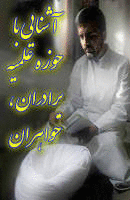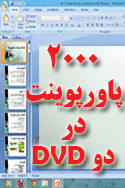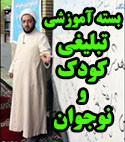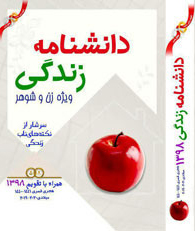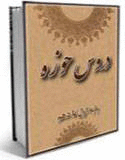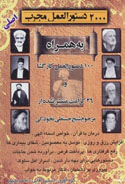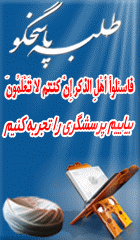کلیپ های دیدنی
مشاوره و خانواده
با توجه به ترک خود ارضایی عوارض آن هنوز در من هست چگونه آن را برطرف کنم ؟
13-08-1399 بازدید:5629 مباحث جنسی و زناشویی همکار پاسخگو

آیا بخاطر وسواس فکری توهین به مقدسات گناه دارد؟
19-05-1398 بازدید:5319 مشکلات و اختلالات روانی همکار پاسخگو
آیا از طریق اینترنت می تواند ازدواج موقت کرد ؟
پرسش: با سلام من 22 سالمه از پارسال با يه دختري در…
از زندگی سیر شدم و آرامش ندارم چکار کنم؟
پرسش : سلام..خواهش ميکنم يه راهي جلو روم بذارين من از…
من از تاریکی شب به دلیل توهمات ذهنیم میترسم چکار کنم؟
پرسش: من وقتي در خانه تنها مي شوم و هوا تاريك…
شب ها كابوس فيلم هاي مبتذل را که قبلا نگاه می کردم میبینم!
پرسش: (در خصوص توبه از ديدن فيلم هاي مبتذل) در اين…
بنده متاهلم و در اینترنت با دختری آشنا شدم که کارمون به گناه کشید!
پرسش: بنده یک مشکلی دارم که می خواستم از شما راهنمایی بخواهم…
جوانی هستم که از زندگی خسته شده و احساس پوچی می کنم!
پرسش: راستش نمی دانم از کجا شروع کنم. 20 ساله هستم…
از طریق اینترنت با پسری آشنا شدم و مدتها با هم در ارتباط بودیم!
پرسش:من دانشجوی ارشد رشته حقوق تقریبا حدود 1 سال پیش…
چرا خانواده ها عاشق شدن را برای جوانان (دختر) بد می دانند؟
پرسش: چرا خانواده ها عاشق شدن را برای جوانان (دختر) بد…
چگونه دیدن فیلم های مبتذل را ترک کنم؟
پرسش: با سلام به حضور حضرت عالي اگرخاطرتان باشد ،من قبلا هم…
با شوهرم قبل از ازدواج رابطه نانشروع داشتم!
پرسش: با سلام من زنی 25 ساله هستم.حدود 1 سال است…
اگر دختری عاشق غیر هم جنس خود...؟
پرسش: اگر دختری عاشق غیر هم جنس خود شود البته نه…
اگر نتوانيم جلو شهوت خود را بگيريم ، چه بايد بكنيم ؟
پرسش: اگر نتوانيم جلو شهوت خود را بگيريم ، چه بايد…
جوانی هستم 21 ساله اهل تهران و تمایل زیادی به سکس دارم
پرسش: من جوانی هستم21 ساله اهل تهران وتمایل زیادی به سکس…
نمي دونم چرا از ازدواج مي ترسم؟!
پرسش: سلام مشکل من اینه که نمي دونم چرا از ازدواج مي…
چرا به زن مطلقه با یک چشم و دید دیگری نگاه می کنند؟!!
پرسش: سلام حاج آقا من یک خانم مطلقه هستم و سوالم اینه…
چرا مخالف رابطه دختر و پسر هستید؟؟!!
پرسش: سلام حاجاقا چند تا سوال داشتم ممنون میشم جواب بدید. 1 چرا…
شب زفاف یا حجله چه شبی است و زن و مرد چکار باید بکنند؟
پرسش: شب زفاف و یا شب حجله که در روایات هم…
چه زمانی برای رابطه جنسی با همسر مناسب است؟
پرسش: چه زمانی برای رابطه جنسی با همسر مناسب است؟ و…
دختری که در سن جوانی و نوجوانی دچار شهوت می شود چه باید بکند؟
پرسش:دختری که درسن جوانی و نوجوانی دچار شهوت می شود…
می خواهم خوب باشم ولی دوست دخترم نمی گذارد!!
پرسش: به دلیل که من مدتی است به شهر آمده ام…
وقتی که عصبانی می شوم دیگر هیچ چیزی دست خودم نیست چکار کنم؟
پرسش: سلام آقای پاسخگو من دارای اخلاق بدی هستم وبا همه خواهر…
من دحتر قبلی نيستم و به يك دختر فاسد تبديل شده ام!
پرسش: من دختري هستم 14ساله من اول دختري سنگين بودم اما…
در مورد وسواسی و راه درمان آن توضیح بفرمایید؟
پرسش: وسواسی چیست و برای درمان آن چه راهکارهایی معرفی می…
خواسگارم بد اخلاق است آیا جواب مثبت بدهم؟
سوال: آیا به پسر بد اخلاق که خواستگاری کرده جواب مثبت…
اخلاقم رُك گفتن است اما حق ميگويم و شوهرم مخالف رفتارم است.
پرسش: اخلاقم رُك گفتن است اما حق ميگويم و شوهرم…
خواستگارم دو ازدواج و یک نامزدی ناموفق داشته جواب مثبت بدم؟
پرسش: خانمی هستم که در گذشته، یک ازدواج_ناموفق داشتم. در حال…
شوهرم گلایه میکنه که چرا همیشه به حرفم گوش میدی!
پرسش: من 20 سالمه 1 ساله ازدواج کردم شوهرم 22 سالشه…
دختر 36 ساله ای که چهره زیبایی ندارد چکار کند؟
پرسش: با سلامدختر 36 ساله اي که مومن و حافظ قرآن…
اختلاف سني پسر با دختر تا چه مقدار ايده آل است؟
پرسش: ميخواستم بدونم ايا ازدواج با دختري که سنش با پسر…
چگونه از انحرافات جنسى به دور باشيم؟
پرسش: در فاصله سنّ بلوغ تا هنگام ازدواج چگونه از انحرافات…
بعضی وقتا اعصابم میریزه بهم با نامزدم بدرفتار میکنم چطورخودمو کنترل کنم؟
پرسش: سلام ببخشید ی سوالی داششتم من دختری۱۸سالم ۷ماهه عقدکردم بعضی…
نقش خانواده در تربيت فرزندان چیست؟
پرسش: نقش خانواده در تربيت فرزندان چیست؟ پاسخ: با سلام و ادب خدمت شما…
نامزدم مي خواهد در كوچه و خيابان آرايش كرده و كمي از موهايم را از روسري بيرون بگذارم!
پرسش: من تا قبل از نامزديم بسيار با حجاب بودم. البته…
چرا برخی مردان در کنار همسرشان آرامش نمی یابند؟
پرسش: قرآن مجيد وجود زن را كانون محبّت و…
علت و شرايط تحقق صيغه چيست؟
پرسش: علت و شرايط تحقق صيغه چيست؟ پاسخ:…
چرا بین دو هوو همیشه اختلاف وجود دارد؟
پرسش: چرا بين دو همسر(زن) با وجود مشروعيّت ازدواج…
پرسش و پاسخ
آیا کسی که شراب بنوشد تا چهل روز نماز و عباداتش قابل قبول نیست ؟
13-08-1399 بازدید:2860 مسائل متفرقه نماز همکار پاسخگو

اذان در جامعه اسلامی نماد چیست ؟ و چرا فقط سه بار در روز تکرار می شود ؟
پرسش: اذان در جامعة اسلامی نماد چیست و…
حکم مشروبات الکلی از دیدگاه اسلام چیست ؟
پرسش: حکم مشروبات الکلی از دیدگاه اسلام چیست…
چرا با این همه ظلم و ستم در جهان امام زمان (عج) ظهور نمی کند ؟
پرسش: چرا با این همه ظلم و ستم…
اگر نگاه به نامحرم گناه است چرا در فیلمهای خارجی زنهای بدون حجاب را نشان میدهند؟
پرسش: چرا میگویند نگاه کردن به نامحرم گناه…

با چه شیوه هایی میتوانیم پیرو انبیاءالهی باشیم ؟
پرسش : چه راه و روشی را پیبگیریم…
چرا زرتشتیان به اعتقاداتشان پایبند هستند ولی مسلمانان نه؟
پرسش : چرا در دین زرتشت گفتار نیک،…
چرا معانی دقیق آیات قرآن مشخص نیست و نیاز به تفسیر دارد ؟
پرسش : به چه دلیل تا تفسیرهای متعدد…
آیا جهت انجام هر کار نامشروعی می توان صیغه جاری کرد ؟
پرسش : اهمیت صیغه کردن در چیست؟ با…
اگر پیامبر (ص) عرب زبان نبود آیا قرآن باز هم به زبان عربی نازل می شد؟
پرسش : اگر حضرت محمد(ص) زبان دیگری به…
آیا در بین پیامبران ،پیامبر خشن هم وجود دارد؟
پرسش : پیامبران به مهربانی معروف میباشند آیا…
با توجه به محاسن روزه آیا معایبی هم در آن هست ؟
پرسش : روزه محاسن بسیاری دارد، آیا این…
جنس خداوند از چه چیزی می باشد و خدا چیست؟
پرسش : جنس خداوند از چه چیزی میباشد…
معنی خدا چیست؟چرا خداوند از حروف دیگر استفاده نکرده است؟
پرسش : تعریف لغوی خدا چیست و چرا…
خال کوبی ابرو (تاتو )از نظر شرعی برای وضو و غسل چه حگمی دارد ؟
پرسش : خالکوبی ابرو (تاتو) از نظر شرعی…
شنیدن صدای زنان در مراسم عزاداری و مولودی چه حکمی دارد ؟
پرسش : شنیدن صدای زنان در مراسم عزاداری…
در چه صورتی امر به معروف و نهی از منکر واجب می شود؟
پرسش : در چه صورتی امر به معروف…
چرا در ایران مردی که از دین خود برگردد حکم اعدام را دارد ؟
پرسش: چرا در ایران مردی که از دین…
آیا ازدواج زن شیعه با مرد سنی اشکال دارد؟
پرسش : آیا ازدواج زن شیعه با مرد…
لمس آیات قرآنی که بر سنگ قبر نوشته شده است بدون وضو چه حکمی دارد ؟
برسش : لمس آیات قرآنی که بر سنگ…
فرق بین احتیاط واجب و احتیاط مستحب چیست؟
پرسش : فرق بین احتیاط واجب و احتیاط…

آیا با زیارت امامان و بوسیدن ضریح آنان انسان دچار شرک می شود؟
پرسش : آیا اعتقاد به این که شیعیان…

چرا در نماز از مهر استفاده میکنیم و فقط پیشانی بر خاک قرار می دهیم؟
پرسش : با توجه به این که هنگام…
آیا علائم هنگام ظهور امام زمان (عج) واقعیت دارد؟
پرسش : آیا وجود نشانههایی هنگام ظهور حضرت…
با وجود مساوات بین زن و مرد چرا مردان در اولویت قرار دارند؟
پرسش : با توجه به این که ما…
طریقه خواندن نماز در زمان رسول خدا (ص) چگونه بوده است؟
پرسش : طریقه نماز خواندن از زمان رسول…
چگونه می توانیم از گناه غیبت پرهیز کنیم؟
پرسش : چگونه میتوانیم از گناه غیبت پرهیز…
چگونه از بدخلقی و صفات زشتم دوری کنم؟
پرسش : چه راهی وجود دارد که انسان…
قطع رابطه با اعضای خانواده که از نظر شخصیتی و اجتماعی مشکل دارند گناه است؟
پرسش : آیا قطع رابطه با افراد خانواده…
آیا روح انسان بعد از مرگ در جسم دیگری دمیده می شود و دوباره به زندگی میکند؟
پرسش : آیا این نظریه درست است که…
اینکه در نماز کاهلی میکنم آیا در دینم خللی ایجاد می شود؟
پرسش : خدا را خیلی دوست دارم،همیشه در…
دلیل علاقه خاص به بعضی از امامان چیست؟
پرسش : چرا برخی برای بعضی امامان ارادات…
در شب اول قبر چه سوالاتی از ما پرسیده می شود ؟
پرسش : شب اوّل قبر چه سئوالاتی از…
آیا دوست داشتن یک نا محرم و ارتباط با او گناه است؟
پرسش : اگر کسی را واقعاً از صمیم قلب…
آیا ادعای ملاقات امام زمان (عج) از جانب برخی افراد صحت دارد ؟
پرسش : بر اساس روایتهای فراوانی امام زمان(عج)…
چرا به اصول و قواعد دین اسلام توجه نمی شود و پذیرش آن از سوی پیروان ادیان دیگر سخت است…
پرسش : دین اسلام کاملترین دینهاست و آسانترین…
آیا نظریه تناسخ از دیدگاه اسلام پذیرفته شده است ؟
پرسش : آیا نظریه تناسخ که بزرگان زیادی…
دست نوشته های طلبه پاسخگو

برای احترام به این ماه هم که شده این کار را انجام بده. مطمئن باش که یاد خدا باعث می شود که هیچوقت به سمت آن اشتباهات نروی.
برای همین یک ماه هم که شده از آن ها صرف نظر کرد و در ضیافت خدا شرکت بنما. بعد از این یک ماه، کیفیت زندگی ات را با گذشته مقایسه کن.
اگر بدتر شده بودی، دوباره به سمت آن گناهان و اشتباهات برو. ولی این ماه چنان عشقی به تو می دهد که دیگر زندگی ات به مانند گذشته نخواهد شد. این ماه خداوند تو را با عشق پذیرایی می کند.
Heavenly Warrant
Heavenly Warrant
Authors(s):
Sayyid M.S. Musavi Garmaroodi
Heavenly Warrant
By: Sayyid M.S. Musavi Garmaroodi
Translated by: M. Mehrabi
In The Name Of God
From afar Medina seemed like a gem in the emerald ring of palm groves, prompting one to laze under the shade of a palm tree and take a refreshing drink of water.
On the path approaching the city from the eastward direction, a young man was leading a herd of camels towards the city. He was mounted on a she-camel, and attending to the herd.
The animals were hungry and the long journey in the barren desert had them worn out. It was blazing hot and the heat of the burning sun beamed down on them relentlessly.
The mouth of the camel driver was dry because of thirst. The restlessness of the herd too told of their thirst and hunger. He was leading the camels toward the town and pushing a bit to get there before the sun would come right up.
The camels, smelling the scent of the orchards and water nearby let loose and got out of control. The young cameleer did his best to contain them but to no avail. Even the camel he was on, the tamest in the herd was restless and no more heeded to her master’s orders.
The young cameleer knew that it was all due to the smell of fresh water and grass which was coming their way in the gentle breeze. It was impossible to hold them back any longer. At this mark, the thick of the palm groves was so visible that one could easily single out the trees; the camels by now were virtually racing toward it.
The young man could do nothing but helplessly look on the dispersed herd gallop madly onward. His own camel too let loose and followed after the rest of the herd. Some of the camels had already reached the groves and to appease their hunger were savagely tearing away the young shoots and the twigs within their reach. The leaves were being crunched under the teeth of the herd and their hungry mouths devoured them recklessly.
The young cameleer ran after them but an old farmer who was watering some of the palms nearby had already made towards the camels in the hope of saving the one-year shoots from their raid. He was swearing angrily and calling the young man bad names. The young man’s rush from one side and the old farmer’s efforts from the other had no use and in the process several young shoots and tons of twigs were destroyed.
The young man picked up a stick and tried to lead the herd away from the orchard but the old farmer seeing that all his hard work had come to ruin was so furious that he picked a big stone and smashed it on the head of the nearest camel. The camel shrieked and toppled down to the ground, laying still, as though it had been dead for years.
The young man who saw incident couldn’t believe his eyes. He, too, saw all his hard work come to nothing. He was to sell the camels and get meager pay.
Thirst; hunger; the toil of the journey; the unrest of the herd and the camel now gone roused such a surge of anger within him that he rushed toward the old farmer crying out.
“What the hell have you done, you old fool? Why in the heavens did you kill the camel for?”
The old farmer who was even angrier retorted:
“The hell it died. Curse on you too who have ruined my hard work of one whole year.”
“Were you blind folded? You old wretch! Didn’t you notice the unrest of the herd due to hunger and thirst? Could it have been my fault? What could I do about it?!”
“Ah, damn you. Of course it is your fault. It’s all your fault because you could not control them.”
“You have killed my poor camel and now you see yourself in the right and are not a bit sorry.”
“Look young man! My loss evens out with your camel’s blood money. That’s all there is to it.”
“You mean to say you square out the blood money of a fine-bred camel against a few palm trees! By God, if you don’t pay for the damage you’ve brought upon me, I’ll root-out all your palms.”
“…HA, HA you are mincing words bigger than your mouth. Don’t you be mistaken that you can do whatever you wish? Oh no.”
“Well, if it is a fact, why then did you kill my poor camel?! It’s just that you city-dwellers always bully us and that’s nothing new.”
“Well now, enough of this. Leave my estate right away or I’ll yet kill another camel; you son of…”
“What!? You threaten me?” And suddenly, the young man not knowing what he doing picked a stone and threw it at the old man.
The old man who was worn out chasing the camels away and was at any rate too old and slow, did not find the time to step aside and the rugged, blunt stone hit him right on the head. The old man moaned in a broken voice and like an uprooted tree fell to the ground and did not get up again. The young man stood over his body dumbfounded and wondered to himself:
“Is he dead!?”
He put himself together. Not a chance; who has seen a little stone kill anyone?
His anger had subsided by now. He was no longer concerned about his camels. He bent over the old man’s body calling him and urging him to stand up. But the old farmer lay still with his open eyes fixed to the sky.
The young man who was now frightened shook the old man even more and called him several times but there was no soul left in the old man’s body to hear him.
The farmers and Han farmers around who were witnessing the quarrel from a distance had by now reached the scene. They saw the young man standing over the old man’s body. They too tried to bring the old man round but he wouldn’t move a finger. Soon, people gathered. Some of them tied up the young man’s hands and sat him under the shadow of a tree. They then saw to the herd and gathered them in a safe lodge.
The news of the quarrel soon reached the old man’s children and they came right away. There was quite a scene and finally the young man was taken to the Judge hand tied.
*****
It was the spring of the twentieth year of Hijra (The migration of the Holy Prophet Mohammad (p.b.u.h) from Mecca to Medina). In hot climates, spring is yet another summer not showing much of what the word suggests. Medina, after the passing away of the holy Prophet, the incident of Saqifa and Imam Ali’s retirement to the house, was a bleak place….
The apostle of the demised messenger of Allah relieved their pain with the presence of Imam Ali, but the martyrdom of the Prophet’s only daughter and heiress, Hadrat Fatimah Zahra, had left an everlasting sorrow and grief on the hearts of the pious believers.
‘Abazar’, one of the greatest apostles of the messenger of Allah was going towards the mosque. With a deep-rooted sorrow, he was reviewing, in his mind, the events that had gone on Muslims after the demise of the holy prophet along the way.
He was thinking: how those awakened consciences has gone back to sleep?! How did all that love, self-sacrifice and fervor; and how did all the altruism and love to be found in every corner of the city which brought faith and piety to the hearts, subside?
Now, kindness and brotherhood had faded away and everyone was thinking of making the most for him out of the wealth and blessing laid through the efforts of the messenger of Allah; Imam Ali, and the implementation of the divine laws of Islam. The continuous victories of the Muslims and the enormous wealth it had poured into Median, together with the corruption of the hypocrite rulers who were indeed wolves disguised as shepherds was taking the new-founded Muslim community to the edge of abyss.
Bazaar’s pure heart and soul was hurt. He was sad at this injustice. Everyone was thinking of eating his own piece of cake and cared about no one else.
All that unanimity and disagreement had given way to dispersion and disunion. Not a hand would stretch out to assistance and not an eye turned in kindness towards the oppressed or underprivileged.
The political division, which had started from the event of Saqifa, was slowly and gradually eating away like a termite at the very fundaments of virtues and goodness; self-sacrifices and god-seeking.
The retrogression of ethical decline was prevalent. It was as if little by little the age of credulity, ignorance and effeteness was working its way back. Agreements were constantly being violated; keeping to promises forgotten; unlawfulness unmasked and lawfulness being masked. The deceitfulness of the transient pleasures of the world blinded the truth. Belief in the afterlife and avidity for beneficence degraded and the lust for superiority, comfort seeking and gratification of one’s own wishes was becoming the goal of life. It was in such an atmosphere of mistrust and hypocrisy that that great man, Abazar, whom the seal of the prophet’s (p.b.u.h.) had named him ‘The Veracious of All’, was suffering. He relieved some of his heartfelt agonies in seeing the inerrant Imam of the time and who had put hope in God Almighty.
That spring day he made out of the house to go to the mosque to perform his daily prayer. Upon reaching the open space of the mosque’s foreground, the tumult of the crowd who had circled round a young man attracted his attention. He went towards the crowd. Two men were holding the arms of a hand-tied young man. The young man was pleading, “In God’s name! I do not intend to run away…Please let me take the camels to their rightful owners and I’ll be back in time for the execution of Judge’s sentence.” People derided him and thought him a simple-minded country herdsman. One of the crowds said,
“You mean they simply let you go!?
Who would then warrant your return?”
The young man answered: “I am a stranger here. I know nobody to vouch for me.”
Another man in the crowd reasoned:
“Who would stand guarantor for someone who has been sentenced to death? If you don’t return, it will cost him his life. Who do you think would be prepared to take such a risk?”
Abazar asked the man standing next to him:
“What has this young man done and what is it that he wants?”
The man answered: “He has killed an old farmer accidentally and has been sentenced to death but the old man’s sons would not accept blood money and ask for retaliation in the same manner. The committed man is asking for a three- day grace to return the camels, which he claims, are left with him in trust. Everyone knows well that this is just a pretext to flee from death penalty.”
The young man was pleading, “Can’t there be found a righteous Muslim to vouch for me?! I promise I’ll return by the end of the third day and you can do with me whatever you want to.”
A voice from the crowd was heard as saying:
“We are all Muslims; but what you are asking is too much. The flown-away bird will not return to the cage.”
The worried look of the young man turned on the faces who had circled round him until his look fell upon the face of a man who had the countenance of decency and nobility in his demeanour. The man couldn’t know what heavenly attraction and kindness there was in the man’s look that he unhesitantly declared:
“I choose this man to be my guarantor. Someone must be to believe what I say.”
The crowd derided him and one of them said:
“What make believe? He even chooses his guarantor!”
The young man looked Abazar in the face and pleaded to him, “Will you vouch for me for three days?”
Silence fell on the crowd. Everyone was waiting to see the reaction of this righteous man of God.
Abazar smiled kindly and said, “All right. I vouch for this man. Let him go. If he doesn’t return in three days’ time, I will bear the responsibility of his action and you may do to me what you are to do about him.” A great uproar surged in the crowed:
-Abazar goes to the slaughterhouse of his own doing.
-Does he know what responsibility he is undertaking!
-That man will not return. This is absolute suicide…
-Nobody knows this killer. Why does Abazar take such a risk?! These were some of the reactions of people.
The sons of the old farmer told Abazar that he would be executed instead of the man if he doesn’t return.
Abazar acknowledged their say and asked them to let the man go.
They freed the man. The young man got on his camel and while riding away shouted back, “I’ll be back before the sunset of the third day.”
Medina was engulfed in tension and excitement. The great apostle of the holy prophet was in danger of an eminent death. Those who thought of Abazar an obstacle in their rule were rejoicing and hoped the young man would not return. But the friends of that great man, Abazar, were anxious and concerned. The event was the talk of the town. Everyone gave his account of what might happen.
Unaffected by all this, Abazar went about his daily business as before, steadfast and composed. It was as if nothing unusual had happened concerning him.
The third day passed the mid-day mark. The worrying seconds ticked away. As the sunset became nearer, the crowd left more anxious. The sons of the dead old farmer were nearly certain that the young man would not return. They warned Abazar to get ready as the sunset was approaching.
Abazar, calm and peaceful, answered them in a way that was a reflection of his strength of faith.
“If he doesn’t show up by the time of the evening prayer, I will be at your hands to carry out the sentence about me.”
The sun retracted its last feeble rays from the tanned mountaintops resting in the laps of the evening stars, but there was not a sign of the young man in sight. The heirs of the old farmer were preparing themselves. Abazar was standing by the Masjid-Al-Nabi (the Prophet’s Mosque) to perform the prayer.
One of the old farmers sons approached Abazar and said,
“Your time is nearly over. Prepare yourself. We will not withdraw our claim and will not allow our fathers split blood to go in vain.”
Abazar reassuring them said:
“Of course, we have only a short while until the call of Azan (call to prayer). That is the dealing and you may do as you wish.”
Everyone was waiting. The moments were crucial…. There was only one step left from death that suddenly a voice from the East gate town was heard:
“He is coming; He is coming.”
All the looks were turned to that direction. A rider came galloping hard; so hard that it was feared the horse he was riding on might collapse any minute. In front of the Mosque the young man dismounted and breathlessly asked for Abazar to be set free.
Everyone was stunned. It seemed as if death was a trivial plaything in the hands of this gallant young man. The sons of the old farmer looked at him in amazement. It was if they were telling themselves… “Is it really possible that he has returned?”
A man from the crowd who was astonished about this man’s valor and fidelity asked him:
“How come you returned to a place where your death is almost certain?” The young man smiled and said:
“That upright man who, in a strange town, believed me and accepted to risk his life because of me did a most godly favor. I was able to take people’s trust back to them. Now how in the heavens could I act so in such a mean way as not to return and let an innocent, faithful man die in my place? !”
“By God! Death is much more pleasing and welcome than such an evil notion. ”, “One should keep one’s promise so that people wouldn’t say it does not exist.”
Abazar who was by then listening thanked God and said: “I too accepted to warrant him without even knowing him to show that trust has not died.”
The young man went towards the old farmer’s sons and told them that he was ready for the execution.
The two sons of the old man were so impressed by the honesty and courage of the young man that they no longer felt any grudge against him. There was not a trace of vengeance or retaliation left in their hearts. The crowds looked on to see what happens next. The two brothers looked at one another and spoke quietly with each other for then announced:
“Abazar warranted and showed that valor and courage still stands. This young man kept to his promise and showed that keeping promises are still practiced. And we, too, take back our claim and forgive him to show that altruism still lives on within us.” Then he turned towards the young man and said:
“You are free to go. We forgive our father’s blood-money and life.”
…The Call of the Prayer was being heard:
وبگــــــــــردی طلبۀ پاسخگو
- فایل اعمال و رفتار های خلاف قانون جناب آقای حسن روحانی
- در کنج خانه طلبهها چه میگذرد؟
- سکوت چند ساله مسئولان حوزه در قبال حملات وحشیانه به طلاب!
- می گویند که مملکت مملکت آخوندهاست!!
- یک ماجرای تلخ که خانم ها با تأمل بیشتر بخونند
- جریان های تکفیری موجود در عراق و نحوه شکل گیری آنها
- سیر تکاملی تفکر سلفیه چگونه بوده است؟
- بداء در قرآن و حدیث چگونه مطرح شده است؟
- پیامبر (ص) با مخالفین خود چگونه بر خورد می کرد؟
- سبک زندگی حضرت زهرا سلام الله علیها
- ملاک کرامت و شرافت افراد، انسانیت است یا جنسیت؟
- رنگ و پوشش های رنگی در اسلام
- حجاب، زنان را افسرده میکند و مانع پیشرفت اجتماعی آنهاست!!!
- علوم لدنی معصومین
- مگر ولی فقیه معصوم است که ولایت مطلقه دارد؟
- اگر خدا ازعاقبت ما اطلاع دارد قیامت برای چیست؟
- آیا بجای نماز خوندن، پیانو یا سه تار بزنم؟
- چرا مراسم عزاداري امام حسين(ع) پيش از شهادت ايشان صورت ميگيرد؟
- چرا امام حسين(ع) در كربلا براي رفع تشنگي از خداوند طلب باران نكرد؟
دانــــــلود های مفیـــــــــــــــــــد
- دانلود پاورپوینت شناخت وهابیت و صهیونیسم و ارتباط با همدیگر
- دانلود دو پاورپوینت اجرای عید غدیر خم
- دانلود پاورپوینت احتجاج اميرمؤمنان (ع) به غدير
- پژوهشی در کلام و پیام مقام معظم رهبری پیرامون ماه رمضان
- خطبه شعبانیه و خطبه امیرالمومنین(علیه السلام) پیرامون روزه و ماه رمضان
- دانلود پاورپوینت و pdf تفاوت های زن و مرد
- دانلود جزوه ساعات سعد و نحس(زمان نوشتن دعا)
- تقویم مذهبی شمیم یار 96 مخصوص کامپیوتر
- دانلود نرم افزار «شیعه شناسی»
- دانلود پاورپوینت ساختار خانواده و مسایل آن
- دانلود کتاب دایره المعارف جنسی
- دانلود نکات جذاب دوران عقد
- دانلود کتاب درمان سرد مزاجی و بی میلی جنسی بانوان
- دانلود کتاب حسادت کودکان
- دانلود کتاب درمان خستگی وناتوانی جنسی
- دانلود پاور پوینت اسیب های ازدواج وخانواده
- دانلود پاورپوینت هشت گام برای تحقق رویا به واقعیت
- دانلود پاورپوینت تقویت اراده
- دانلود پاورپوینت موفقیت وروشهای رسیدن به ان
- دانلود پاورپوینت هنر رفتار با افراد دشوار
- دانلود پاورپوینت جملات جالب وجذاب روحیه بخش بزرگان
- دانلود پاورپوینت راههای مقابله ودرمان استرس
- دانلود پاورپوینت نیازهای اساسی کودکان
منبــــرهای مکــــــــــــــــــتوب
- منبر مکتوب: روز عرفه و فرصت ها
- منبر مکتوب: سبک زندگی امام باقر علیه السلام
- منبر مکتوب: سه نیاز مومن (امام جواد علیه السلام)
- سخنرانی سلسله ای و چند جلسه ای مناسبت ماه رمضان
- دانلود 30 جلسه سخنرانی ماه مبارک با موضوع تنها مسیر
- موضوعات پیشنهادی سخنرانی برای محرم
- فضائل حضرت قمر بنی هاشم علیه السلام
- برکات وجود ابا عبدالله علیه السلام بر عالم
- بررسی بُعد اخلاقی،عبادی و عرفانی عاشورا
- آخرين وصيت امام حسين عليه السلام
- اولین علت رویاروی در کربلا؛ دوری از یاد خدا
- هميشه حزن؟ شادي چرا نه؟ - شب دهم محرم
- چرا نفرين ؟ - شب نهم محرم
- نماز ظهر عاشورا - شب هشتم محرم
- فلسفه عزاداری - شب هفتم محرم
- دفاع از دین - شب ششم محرم
- فلسفه حضور خانواده سيد الشهداء - شب پنجم محرم
- علم امام علیه السلام به شهادت - شب چهارم محرم
- فقدان شرایط امر به معروف و نهی از منکر- شب سوم محرم
مناظرات طلبه پاسخگو
بیشترین دانلود ها
- دانلود صوتي تکنیک های نزدیکی زن و شوهر (108151)
- دانلود رایگان کتاب خواص سوره های قرآن (54964)
- دانلود پاورپوینت بسیار مفید مهارت های زندگی (37574)
- دانلود پاورپوینت و pdf تفاوت های زن و مرد (34082)
- دانلود كتاب مسائل جنسي و زناشوئي در احاديث (33876)
- دانلود کتاب دایره المعارف جنسی (32104)
- دانلود پاورپوینت های آموزش پیش از ازدواج (30660)
- دانلود بسیار مفید پاورپوینت آئین همسرداری (30052)
- دانلود پاورپوینت آموزشی بررسی رابطه دختر و پسر (29696)
- دانلود 110جلد کتاب بحارالانوار علامه مجلسی ره (29684)
- دانلود كتاب دختران خوب به آسمان می روند دختران بد به همه جا (28631)
- دانلود کتاب آموزش جنسی آقایان (28435)
- دانلود كتاب فرق و مذاهب كلامي استاد رباني گلپايگاني (28331)
- دانلود کتاب درمان سرد مزاجی و بی میلی جنسی بانوان (28280)
- دانلود نکات جذاب دوران عقد (27832)
- دانلود نرم افزار «شیعه شناسی» (26196)
- دانلود کتاب درمان خستگی وناتوانی جنسی (25374)
- دانلود پاورپوینت تقویت اراده (23848)
جدیدترین مطالب سایت
- پاسخ به شبهات ولایت (4715) بازدید
- پاسخ به شبهات ولایت (4507) بازدید
- اذان در جامعه اسلامی نماد چیست ؟ و چرا فقط سه بار در روز تکرار می شود ؟ (3909) بازدید
- باتوجه به عادل بودن خداوند چرا بعضی از انسانها را ناقص الخلقه آفریده است ؟ (3990) بازدید
- ویژگی خاص قرآن چیست که کسی نمی تواند مانند آن را بیاورد ؟ (4243) بازدید
- با توجه به ترک خود ارضایی عوارض آن هنوز در من هست چگونه آن را برطرف کنم ؟ (5629) بازدید
- آیا بدن اخروی مانند بدن مادی است ؟چهره ی واقعی انسان در قیامت چگونه است ؟ (5029) بازدید
- آیا ادعای ملاقات امام زمان (عج) از جانب برخی افراد صحت دارد ؟ (4523) بازدید
- چرا به اصول و قواعد دین اسلام توجه نمی شود و پذیرش آن از سوی پیروان ادیان دیگر سخت است ؟ (4914) بازدید
- فلسفه وجود لباس روحانیت در عصر حاضر چیست ؟ (3567) بازدید
- آیا وظیفه یک روحانی تنها راهنمایی مردم و فعالیت و تدریس در حوزه هاست ؟ (2956) بازدید
- آیا نظریه تناسخ از دیدگاه اسلام پذیرفته شده است ؟ (5258) بازدید
- آیا توصیف بهشت و جهنم در قرآن تمثیل هایی برای درک بهتر آن جهان است ؟ (4862) بازدید
- با توجه به اینکه اسلام کاملترین دین هست چرا ما نسبت به کشور های غیر مسلمان عقب مانده تر هستیم ؟ (6779) بازدید
- نقش امام و رهبر در جامعه اسلامی چیست ؟ و اگر نباشد چه اتفاقی می افتد ؟ (4561) بازدید
پربازدیدترین های سایت
- زنی هستم که میخواهم به شوهرم خیانت کنم!!! (605471)
- آيا زن شوهر دار بخاطر رفع نیاز جنسی اش ميتواند صیغه شود؟ (501125)
- دوست دخترم حامله شده چکار کنم؟ (398670)
- میل جنسی زیادی دارم و به شدت داره منو عذاب می ده (340660)
- دیدن فیلم های مبتذل زن و شوهر برای تحریک شدن جنسی (217875)
- چگونه همسرمان را آماده آميزش جنسي كنم؟+18 (213185)
- حکم شرعی نزدیکی از پشت! (208184)
- خانم هایی که می خواهند طلبه شوند بخوانند!!! (205680)
- زنم رابطه جنسی برقرار نمیکند!!! (199708)
- از تجربه های تلخ و تکان دهنده دختران بخوانید شاید... (172435)
- گناه با محارم خود داشتم! (146441)
- رابطه جنسی دهانی حكم چيست؟ (131015)
- محرمات و مکروهات و مستحبات حائض+حکم ورد به امکان مقدسه (129543)
- به رابطه خانمم با خواهر زاده اش مشکوکم؟ (123423)
- سفارش اسلام در مورد آمیزش صحیح چیست؟ (99090)
- نام كتاب حضرت نوح و حضرت ابراهیم؟ (97095)
- با زنان چشم سبز ازدواج نکنیم؟ (94839)















































